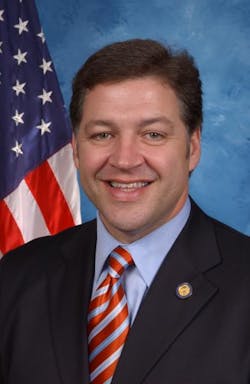At its heart, “devolution” would mean phasing out the existing federal highway program by shifting the current federal taxing authority to state governments over the course of several years. In essence, “devolution” takes most surface transportation responsibility from the federal government—and the revenues to fulfill it—and “devolves it” to the state level.
It’s no surprise that advocates of smaller government – many of whom are conservatives – are champions of “devolution,” one of them being Sen. James Inhofe (R-OK) (seen at right) currently chairman of the Senate environment and public works (EPW) committee.
Yet Inhofe – by his own admission – is changing his tune where “devolution” is concerned and is now instead strongly backing efforts to retain the federal government’s current role in transportation policy.
“I’m the most conservative member of the Senate,” Inhofe noted during a speech at AASHTO’s annual gathering this week. “But Article 1, Section 8 of the U.S. Constitution plainly says what the federal government is supposed to do: defending America and building roads and bridges. This is our responsibility; what we’re supposed to be doing.”
[You can view more of his speech below, which ranged far and wide over many different issues.]
This "turnabout" is also interesting as legislative attempts to “devolve” the federal highway program were at full throttle in recent years. For example, note the speech below by then-Sen. Jim DeMint (now with the Heritage Foundation) back in 2012 describing why states should be empowered to make their own transportation decisions.
Yet the winds on Capitol Hill seem to have firmly shifted against devolution – maybe even on a permanent basis.
Indeed, Rep. Bill Shuster (R-PA), chairman of the House of Representatives transportation and infrastructure (T&I) committee, made a powerful historical argument at AASHTO’s yearly briefing in favor of maintaining the current federal role in transportation.“It’s important when talking about the founding of our country to remember that transportation was a breaking point; a point where they threw the Articles of Confederation out,” he explained.
“So the U.S. Constitution – Article 1, Section 8 – made pretty clear the role the federal government should play: providing for common defense, interstate commerce, and the establishment of post roads,” Shuster (seen at right) emphasized. “So there’s always been a federal role when it comes to building infrastructure in this country.”
He went on to cite Adam Smith, author of The Wealth of Nations, to further bolster his position.
“On page 393, Smith said that the federal government should do three things: provide security, preserve justice, and erect and maintain infrastructure to promote commerce,” Shuster said. “So it can’t be clearer to me: Adam Smith said it, the Founders said it, and it’s why the federal government has had a role in transportation for the last 233 years.”
Does all of this mean, then, that the concept of “devolution” is definitely dead as a policy option? Perhaps not completely, for Shuster also noted that the states tend to move a lot faster – and often cheaper – when it comes to transportation projects when compared to the federal government.
“We’re going to be trying to get Washington out of your way, so you can do transportation projects quicker and faster with less expense,” he explained at AASHTO’s gathering. “Accelerating projects will help stretch federal dollars.”
Inhofe added in his remarks that lower costs is one of the main reasons he’s now working hard to craft a long-term surface transportation bill that preserves the federal role.“The only alternative to a long-term bill are more short-term extensions and its costs 30% more right off the top with short-term extensions,” he stressed.
Yet cutting transportation infrastructure costs is also one of the advantages touted by proponents of devolution – especially Robert Poole (at right) with the Reason Foundation, as you can see by reading here, here and here.
Back in 2006, for example, Poole conducted a fiscal analysis of how the federal government managed transportation funding and didn’t like what he found.
“Back in 1996, during the initial devolution debate, I crunched some numbers to provide an alternative look at which states win and lose from the federal program,” he said.
“After adjusting what each state gets back to account for (1) higher costs for those projects done with federal funds, (2) state and federal overhead associated with the grants programs, and (3) the distortions in project selection introduced by ‘free federal money,’ I concluded that over the years 1956 to 1994, only 18 states plus the District of Columbia were actually net gainers,” Poole stressed. “All the others got back less, in real terms, than they paid in – and arguably would have been better off if they'd never sent the money to Washington in the first place.”
From the cost-saving perspective, then, perhaps “devolution” is a policy avenue that is only “mostly dead” at this point – and as everyone knows, there’s a big different between “mostly dead” and “all dead.”
Now all that remains is to actually pass a long-term surface transportation bill by the end of May. We’ll see if that happens.



